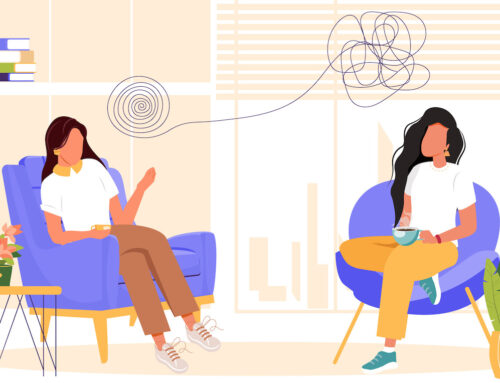Back in 2016, I decided I would see what this whole therapy thing was about. I booked a session, sat across from a stranger, and shared intimate details about my personal struggles — it was awkward, made me feel nervous, and was hands-down one of the best decisions I’ve ever made.
Since then, I’ve moved to a few different cities. Each time I move, one of the first things I do is search for a new therapist. The search is not always quick. I’ve met a therapist whose long pauses made me nervous; a therapist whose chattiness made me flustered; a therapist whose advice just didn’t quite fit; a therapist whose advice was perfect, had I only been ready for it. Each person was the right therapist for someone, just not for me. But then, after trying on a few different therapists, I’d meet my perfect fit.
This is all to say that finding a therapist with whom you feel compatible, a sense of ease, and who provides the kind of support, tools, listening, and guidance you need takes time and patience — but the payoff is enormous.
I spoke to Georgetown Psychology’s Caroline Spearman, PsyD, BCN to learn a few pointers for finding yourself a therapist or helping a loved one choose theirs.
With so many therapists out there, how can I streamline my search for “the one”?
Many therapists have targeted profiles that state the population they have the most experience in. Try finding someone who specializes in working with people of your age range, gender, or what you are seeking help for.
Many therapists also offer a free phone consultation prior to the intake so you can get a better sense of how they work. Definitely take them up on that if it is an option.
Finally, seek a referral! Ask your primary care, psychiatrist, teacher, school, or friends for therapists that they recommend.
I booked a session! Are there questions I should ask to determine if they’re the right fit?
Fit can be based purely on feel. Many people don’t ask any questions about my style and will base goodness of fit on how comfortable they are sharing difficult information and talking about difficult feelings in the first few sessions.
[However,] if you want more details about what therapy will actually look like, here are a few questions you can ask:
- How directive are you in session? Will there be specific skills that I learn? Will you teach me about relevant topics? Will you be giving me homework to do? Will I have free reign to talk about anything I’d like?
- How will each session start? Will you lead or should I have ideas of what I want to talk about?
- How will I know that I am making progress?
I went to my first session! But it felt stiff and uncomfortable. Should I bail?
Don’t immediately panic! The first session is the intake session, which consists of reviewing policies, procedures, and paperwork — pretty stiff stuff. Then, the therapist will ask a variety of questions to get to know you better.
These first few sessions can feel a bit awkward as the therapist is doing all of the asking and you are doing all of the sharing (not to mention to a complete stranger). Over time, you’ll feel more comfortable as the therapeutic relationship develops and the sessions have a much more natural flow to them.
Again, I’d encourage people to go with how they’re feeling in session. You want to feel that you have the space you need to talk about whatever is coming up for you in that moment – whether it be events from the week, how you’ve been feeling lately, or something from your past.
My kid went to their first session and wasn’t immediately sold. What can I tell them?
I would recommend that the parent first ask their child what felt weird, or awkward, or what they didn’t like and then listen openly to what they have to say. Parents should then let their child know that it is completely normal to feel this way after the first session.
They might tell their child that it can be uncomfortable to open up to a stranger but encourage them to give it some time because all relationships take time to develop.
Reassure them that you and the therapist are there to help them and if things continue to feel weird or awkward after a few sessions, then you’ll figure out the next steps then. The next step might be to have an older teen bring up this issue with the therapist directly or to have the parent talk with the therapist about it.
Okay, my child and/or I have decided to go to a few more sessions. If it’s not a good fit, how should I tell the therapist?
If something is bothering you about your sessions, please bring it up! Therapists want to make sure they are doing what they can to meet your needs.
It’s okay to be nervous about broaching the topic of finding a new therapist but it’s something [all therapists have] been through so we won’t take it personally!
You can let your therapist know that you are having trouble opening up or aren’t sure if you are making progress. That should be all they need to hear to have an open discussion about how therapy is going from your perspective. This type of check-in is very normal in therapy and is usually very helpful!






